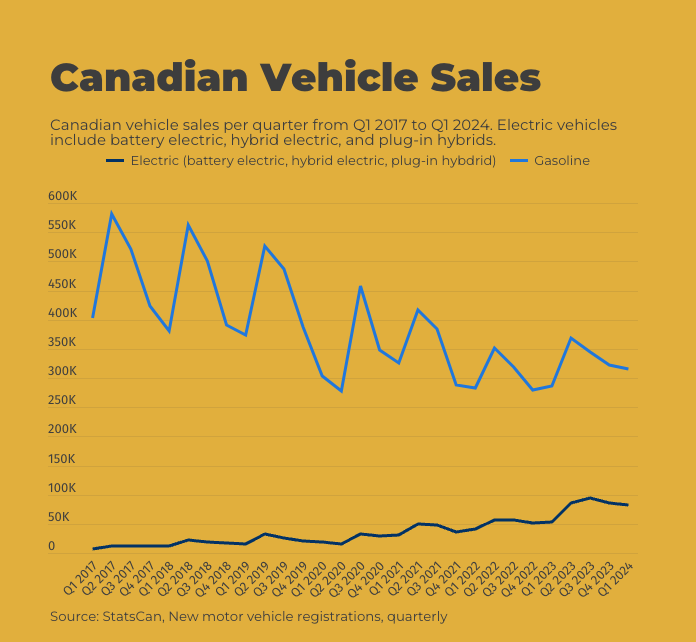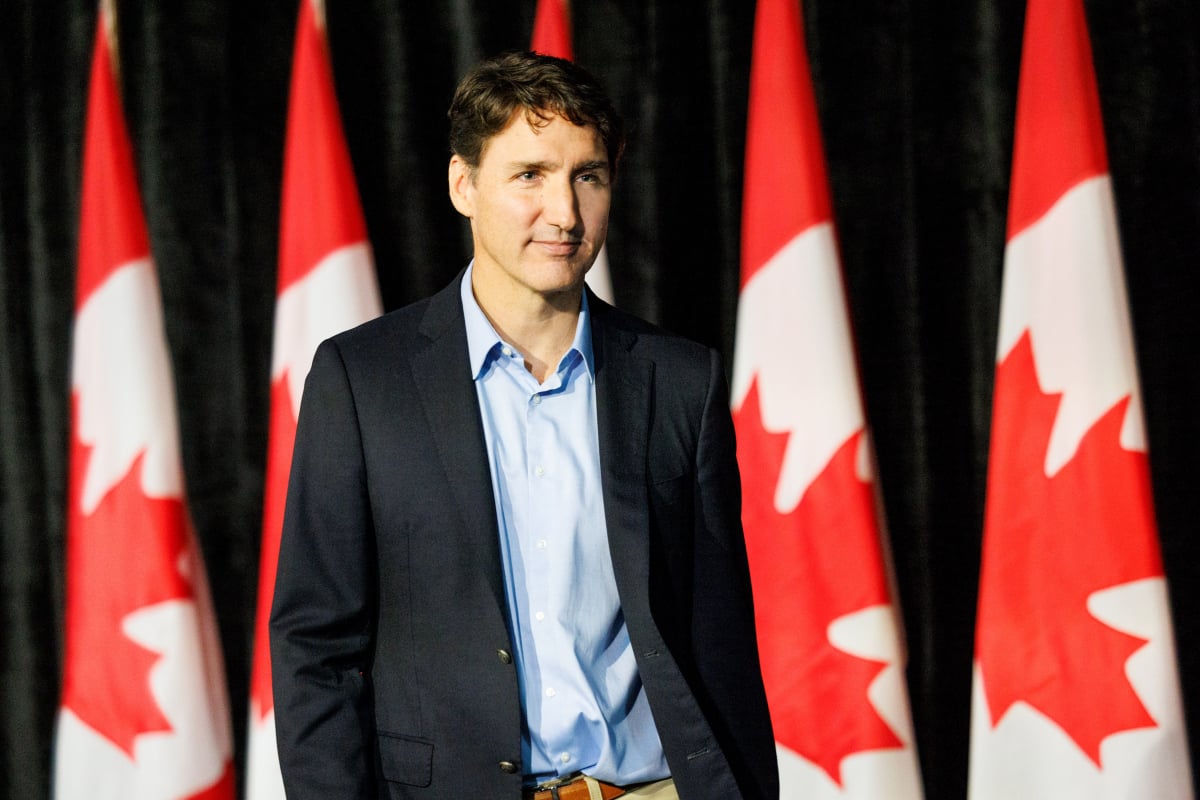Support strong Canadian climate journalism for 2025
Clean transportation advocates say Prime Minister Justin Trudeau’s decision to slap Chinese electric vehicle manufacturers with new tariffs will slow the adoption of electric vehicle sales in Canada, jeopardizing climate goals and making it more expensive for consumers.
“This decision, I think, has been driven more by politics than by concerns for affordability or the environment,” said Nate Wallace, Environmental Defence’s clean transportation program manager, in an interview with Canada’s National Observer.
Speaking to reporters Monday morning at the federal cabinet retreat in Halifax, Trudeau outlined the plan to spike tariffs on Chinese electric vehicles by 100 per cent, and on Chinese-made steel and aluminum products by 25 per cent. The tariffs are set to take effect on Oct. 1 and Oct. 15, respectively.
Wallace said by deliberately raising prices, the plan will slow the adoption of electric vehicles and effectively shut down Chinese imports.
“Setting the tariff levels at 100 per cent is not actually about leveling the playing field, it's about shutting out competition entirely,” Wallace said.
Environment and Climate Change Minister Steven Guilbeault said in an interview with Canada’s National Observer his government’s “goal is certainly to see [EVs] become more affordable.”
Responding to whether the tariff will eliminate the most affordable options for people looking to switch from gas to electric, he pointed to the incentives the federal government has had in place for EVs since 2019.
As of now, there are two tiers of incentives: electric, hydrogen fuel cell, and longer-range plug-in hybrids are eligible for a rebate of up to $5,000 while shorter-range EVs can bring in up to $2,500.
Automakers have adapted during this time, Guilbeault stressed. He was outside government when the program was launched and advocated for a higher price ceiling for vehicles allowed into the rebate program (a passenger EV must cost less than $55,000 to qualify, for example).
“And what ended up happening is a bunch of EV producers brought down the cost of their vehicles so they could fit under the federal ceiling,” he said.
Framing the decision as a way to level the playing field between Chinese and Canadian companies, Trudeau said he made the call after speaking with United States National Security Advisor Jake Sullivan on Sunday.
“We are transforming Canada's automotive sector to be a global leader in building the vehicles of tomorrow,” Trudeau said. “But actors like China have chosen to give themselves an unfair advantage in the global marketplace.
“So we're taking action to address that.”
Trudeau also emphasized the new tariffs are to align with Canadian allies such as the United States and European Union, which have introduced tariffs, at varying levels, on Chinese electric vehicles. The U.S. imposed a 100 per cent tariff earlier this year, while the European Union announced in July a range of tariffs, from 17.4 per cent to 37.6 per cent depending on the automaker.
Canada is considering further tariffs on batteries, battery parts, semiconductors, solar products and critical minerals, Finance Canada said in a news release.
“Everyone is screaming about China subsidizing green industries and subsidizing EVs… [but] if you actually break down the numbers, the vast majority of the money is in sales tax exemptions for domestic EV adoption, the build out of charging infrastructure, and incentives to purchase EVs,” Wallace said. “These are all standard-fare climate policies that most countries have, or should have.
“The idea that we should be punishing one of the largest global emitters for adopting climate policies, I think, is counterproductive to Canada's own interests in global climate action.”
While Canada followed the U.S. approach, the European Union thoroughly studied the issue. Rather than copy the U.S., the European Union launched an investigation requiring Chinese automakers to open their books to understand exactly how much they were receiving from the Chinese government. Companies that refused to participate were slapped with “punitive” tariffs to encourage cooperation, Wallace said.
The European Union sampled three Chinese automakers (BYD Auto, Geely and SAIC Motor Corp.) and applied tariffs of 17.4 per cent, 19.9 per cent, and 37.6 per cent, respectively. Other Chinese electric vehicle producers that cooperated in the investigation are subject to a 20.8 per cent duty, reflecting a weighted average, while companies that did not cooperate are slapped with the higher 37.6 per cent tariff.
The European approach is a way to strike a balance between leveling the playing field while allowing healthy competition, Wallace said. Without competition, legacy automakers are under less pressure to innovate and lower prices, both of which benefit consumers, he added.
While EVs are one part of decarbonizing transportation, Guilbeault said they need to be viewed in tandem with the Permanent Public Transit Fund, which will divvy out $3 billion each year starting in 2026.
“It's the most important investment in the history of Canada by the federal government in public transit and active transportation,” he said.
Advocates argue the funding should start this year, and should be for double the amount proposed.
EV Competition
On earnings calls with investors, Western automakers make no secret about the electric vehicle landscape today. Profit margins on electric vehicles are thinner than their gas-powered counterparts, and those profits are further challenged when cheaper Chinese vehicles are growing in popularity with consumers.
Stellantis CEO Carlos Tavares told investors on a July earnings call that the “heavy pressure of the Chinese offensive” in European markets is expected to bring the cost of electric vehicles down, but import tariffs will help the company fend off Chinese competitors by pushing up the cost of those cheaper vehicles.
Tavares also said Stellantis would introduce electric vehicles for the European market starting at €20,000 ($30,000).
“This demonstrates that we can be profitable and affordable while being a zero-emission vehicle,” he said. “This is the demonstration that we can fight against our Chinese competitors.”
Wallace said Chinese competition in Europe is forcing Western automakers to offer affordable electric alternatives. If that competition is effectively shut out of Canada, Canadian consumers won’t reap the same benefits.
“EVs need to be affordable if we're going to drive adoption, and we've so far been reliant on battery innovation happening in China to drive down EV battery prices and production costs across the entire sector,” he said. “And now that we've shut that out, and we've shut out competitive pressures… Canada has no strategy to make an affordable EV available in Canada.”
The federal government has introduced a zero emission vehicle mandate, requiring all new cars be non-emitting by 2035 — a commitment it made at the United Nations annual climate conference in Glasgow in 2021. However, electric vehicle sales in Canada vary significantly by province.
In 2023, Canadian electric vehicle sales hit about 12 per cent of market share, compared to 24 per cent in Europe and 44 per cent in China. While sales of EVs have grown since 2017, they lag far behind gas guzzlers.

In 2023, B.C., Ontario, and Quebec accounted for over 90 per cent of new zero emission vehicle sales, according to the Canada Energy Regulator. In B.C. and Quebec, electric vehicle sales are nearly double the national average, thanks to lower electricity prices and more generous incentives.
In a statement, Clean Energy Canada director of public affairs Joanna Kyriazis said Canada’s decision to impose tariffs will result in fewer affordable electric vehicles, less competition and more pollution.
“Currently, Chinese brands make up 50 per cent of EV sales globally, but perhaps more critically to our own supply chains, 80 per cent of battery cells are produced in China,” Kyriazis said. “Many North American automakers still rely on Chinese-made components, including batteries, in their supply chains. Slapping tariffs on these could have further cost implications for Canadian consumers — not just on EVs, but other electronics as well.”
Kyriazis warned that in an attempt to protect Canadian auto manufacturers, the federal government could “inadvertently undermine the market,” because by slowing EV sales, auto manufacturers may cancel or delay their EV ambitions — as with GM’s decision to discontinue the Chevy Bolt last year.
“The Chevy Bolt is by far the cheapest EV available in Canada and has sold better than any EV in the country not made by Tesla,” she said. “Canadians no longer have any options at that same price point.”
“To offset cost impacts to consumers and ensure EV uptake continues going strong, the federal government should complement its trade response with an EV affordability package,” she said, recommending the government extend its incentives for electric vehicles program, lower the price cap on rebates for EVs, and introduce new rebates for used EVs.
Guilbeault worked with China on the UN biodiversity conference in 2022, and in 2023 he went to Beijing to attend the annual general meeting of the China Council for International Cooperation on Environment and Development.
Asked whether the 100 per cent tariff could impact the dynamic he has worked to build, he noted: “It’s always a possibility.”
“There were lots of things that we had to juggle with when making that decision [to impose tariffs], but I'm very confident with the decision we made,” he said, speaking of the decision broadly.
The tariff fits into the broader context of Canada successfully working with the country on some issues while disagreeing on others, such as human rights in the EV industry, Guilbeault said, calling the disagreement a “shared belief.”
He isn’t saying China isn’t doing anything on climate, but, “the reality is that we're doing way more here in Canada.”







Comments
Basically, the Liberal Party slapping tariffs on China EVs, is to appease the nonstop foot dragging by the North American auto industry to produce affordable EVs. Take Ford or GM, all they have done is offer high end EV models that the average Canadian family don't need, just toys for the higher end, well off Canadians that have nothing better to do with their money.
Then we have provincial conservative premiers that eliminated any EV incentives.
So we are building more battery plants, that doesn't translate into more affordable EVs, or has it resulted the North American automakers stepping up the EV game, just delays and more delays with excuses the market isn't there. It appears more of an excuse to appease the oil & gas industry to achieve more delays.
But I have a better idea, lets eliminate all the subsidies that tax payers give the oil & gas industry and redirect it to the automakers to produce affordable EV that the average Canadian can afford to buy. That would be money better spent than filling the pork barrels of the oil & gas industry already enjoying record profits.
That's a horrendous amount of money i.e. carbon subsidies. 85% of Canadians live in cities. Thus, 85% of the money should go to creating and improving transit-oriented communities and 15% to EV infrastructure.
The US and Canadian governments are subsidizing EV and other "green" industries big-time. Why is it OK for us to do that but not for China? Tariffs will only hurt consumers and slow the transition. Obviously Canada is only following the US (as usual). So much for "affordability" and "climate policy".
I have had about $20k (and counting) cued up for the last 2 decades wanting to by the equivalent of an electric VW Beetle that works in Edmonton.
As long as the problem of climate change is left to sovereign nations it will not even be acknowledged let alone acted on. They are more addicted to fossil fuel than people. Carl Sagan said it: "Who speaks for earth?"
Michael Grant 315ppm
China is falling into economic troubles, and betting on manufacturing to save it. There's little they wouldn't do to grab the world car market, so I tend to be willing to believe the accusations.
That said: the North American producers are just not putting out smaller vehicles, and it would be hugely instructive how many people would give up the "safety" of an extra tonne of SUV around them, if they could drop from $70K to $25K and still get around.
What I find as a policy with more kneejerking than forethought is the slapping of tariffs on Chinese steel, aluminum and batteries. You'd be searching long and hard for manufactured products consumed in the West without Chinese material and fabricated content. Welcome higher prices.
We should be making our own steel at home, and subsidizing industry's electrification. The long term contribution of value added economic activity like this is far greater. Trudeau is merely taking the easy, 18th Century immature route of shipping raw resources overseas and importing the products made from them, with or without tariffs. And mimicking the US instead of constructing our own economic and industrial strategy. In doing so, the Libs have just ensured that inflation, the resource curse and the dependency on foreign economic prowess is permanently locked in. And that fighting climate change and fundung adaptation measures will be that much more costly.
Through deep R&D and commiting to mass production at scale, China brought down the cost of making solar PV panels to about 1/200th of what they were when Germany decided to build them using feed in tariffs 20 years ago. The Chinese progress in batteries is truly phenomenal. Now Trudeau is applying tariffs on Chinese solar and battery units to what, protect Canadian solar and battery production that is either non-existant or barely off the ground?
Does anyone in the Liberal cabinet have any understanding or training in economics? The only good thing I can say about these tariffs is that the Conservatives would do a lot worse on any policy regarding renewables and climate.
So, Canada wants to be a player in the battery industry. The Libs and Ontario Tories put big money on the table. Have either of them done any research on battery tech, or recognized just how fast and far they've advanced mainly through Chinese effort? Yes, China stole or bullied Western technology transfers out of Western company hands (these tariffs may be in part inspired by that), but now the world is seeing the start of a global tsunami in affordable electrification as the result, the most powerful knock on fossil fuel dependency we've seen so far.
Lead acid with low energy density to lithium and huge increases in energy density, and now salt and sodium, two of the most abundant elements, on the horizon, all able to massively aid our fight against climate change. An evolutionary process.
Has government developed any R&D component as part of its huge battery subsidy program? Or will it allow old tech to try to compete against new?
Canada and the US have spent decades connecting with China to engage them in international trade to make them more like the free enterprise West. Now Canada is recoiling from the commercial success of the Chinese EV industry. Rewarding successful initiative in the business world is normally mainstream business news, but getting outflanked by the folks you are trying to convert to your way of doing business is clearly unacceptable! Even if their success could provide a significant boost to remedying the urgent need to address climate change. The Canadian government policy based on that urgent necessity is being sidelined to accommodate a second, concerned with "unfair" trade practices and short term business considerations. Long-term survival of humanity on this planet depends much more on the former.
Nobody seems to be worried about retaliatory tariffs from the Chinese. What about our $31B subsidy for transporting Alberta oil to the Pacific to ship to China??? There are lots of places they could hit us where it hurts. Don't poke the Dragon?